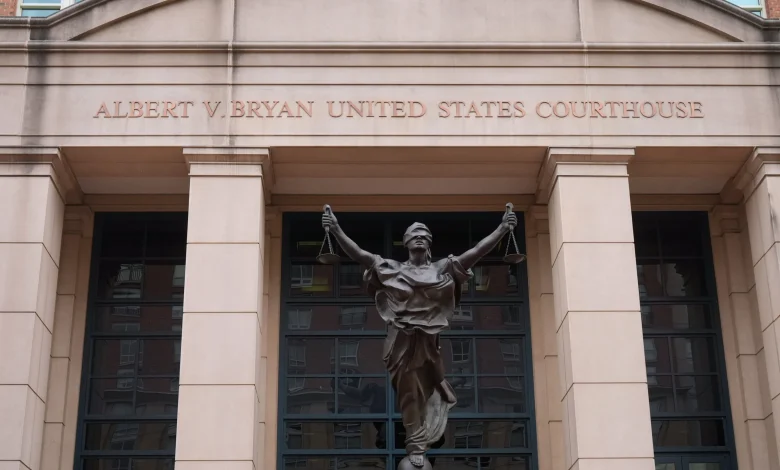In Stunning Admission, DOJ Says Grand Jury Never Saw Indictment Against Comey

The Albert V. Bryan United States Courthouse is pictured, Thursday, Sept. 25, 2025, in Alexandria, Va. (AP Photo/Mark Schiefelbein)
Federal prosecutors admitted Wednesday that the grand jury handling the criminal case against former FBI Director James Comey never reviewed or voted on the final indictment used to charge him — a virtually unprecedented revelation that could topple the entire case.
The admission, reported by CNN, answers a months-long mystery that surfaced the moment the indictment was filed.
Two different versions appeared on the public docket within minutes — one with three counts and another with only two. Legal analysts immediately noted something was off.
Wednesday’s disclosure confirmed the Justice Department filed an indictment the grand jury never approved.
CNN later reported that interim U.S. Attorney Lindsey Halligan and DOJ prosecutor Tyler Lemons admitted in open court that only two grand jurors ever reviewed the rewritten indictment — meaning the full grand jury never saw it at all.
“The new indictment wasn’t a new indictment,” Lemons said.
“There is no indictment,” Comey’s attorney replied.
Lemons also attempted to push back on concerns about political pressure, insisting “Ms. Halligan was not a puppet.”
During the hearing, U.S. District Judge Michael Nachmanoff, who is overseeing Comey’s prosecution, ordered the DOJ to file a formal response about the indictment revelations by the end of the day Wednesday.
The revelation landed just days after a federal judge issued a blistering opinion detailing alarming irregularities in the case. In that Monday ruling, U.S. Magistrate Judge William Fitzpatrick warned that evidence in the record already suggested the indictment returned in open court might not be the indictment the grand jury considered.
“The record points to a disturbing pattern of profound investigative missteps,” the judge wrote. “Missteps that led an FBI agent and a prosecutor to potentially undermine the integrity of the grand jury proceeding.”
Fitzpatrick further described the scenario that prosecutors ultimately admitted was true.
“If this procedure did not take place, then the Court is in uncharted legal territory in that the indictment returned in open court was not the same charging document presented to and deliberated upon by the grand jury,” he added. “Either way, this unusual series of events, still not fully explained by the prosecutor’s declaration, calls into question the presumption of regularity generally associated with grand jury proceedings, and provides another genuine issue the defense may raise to challenge the manner in which the government obtained the indictment.”
The admission strikes at the most basic safeguard in the criminal justice system — the requirement that ordinary citizens, not political leaders, decide when someone can be charged with a crime. By evading that principle, the Trump-led DOJ appears to have rewritten the indictment in secret after the grand jury rejected one of the original charges, then filed the altered document without ever sending it back to the jurors.
Fitzpatrick explicitly identified that concern in his order, noting the extraordinary timing gap between the grand jury vote and the courtroom return.
“The short time span between the moment the prosecutor learned that the grand jury rejected one count in the original indictment and the time the prosecutor appeared in court to return the second indictment could not have been sufficient to draft the second indictment, sign the second indictment, present it to the grand jury, provide legal instructions to the grand jury, and give them an opportunity to deliberate and render a decision on the new indictment,” he wrote.
Fitzpatrick detailed other concerning departures from normal DOJ practice, including the use of a compromised witness and whether it disregarded constitutional limits in a rushed search for evidence.
All of it, Fitzpatrick concluded, raised serious questions about the government’s conduct.
“The Court is finding that the government’s actions in this case – whether purposeful, reckless, or negligent – raise genuine issues of misconduct,” he said. “The Court has before it a rare example of a criminal defendant who can actually make a particularized and factually based showing that grounds exist to support the proposition that irregularities may have occurred in the grand jury proceedings and may justify the dismissal of one or more counts of the indictment.”
If the indictment is dismissed — Wednesday’s admission makes that outcome increasingly likely — the Justice Department cannot simply fix the defects and try again.
The statute of limitations expired in September. This means dismissal would end the prosecution entirely.
Jacob Knutson contributed to this reporting.




